Day 2: Friday, November 14, 1997
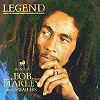 In the morning, we shove off with the first light.
One or two "type-A's" are jogging laps around the upper decks of the Love Boats,
but otherwise the island is fast asleep.
We head back out of the harbor and steer West; destination Vieques Island and, later, Puerto Rico proper.
There is considerably more boat traffic around the U.S. Virgin Islands than we saw in the BVI,
and infinitely more than we saw on the sail down from Bermuda.
One of these boats--an eighty foot freighter or trawler--comes barreling down on us.
It is crewed and skippered by black island men, one standing, one smoking, one lounging on the top of the cabin,
leg draped over the side. "Hey Mon. Which one is Tortola?", the captain bellows out,
over the din of his diesel engines.
"Huh?" is my first response.
How can you be thirty miles from Tortola with no chart and no local reckoning of where you are going?
He swings around for a second pass.
How can I communicate all of the small islands, passages, reefs, etc. that separate us from Tortola.
In the end, I point Northeast and shout, “Dat-a-way.”
In the morning, we shove off with the first light.
One or two "type-A's" are jogging laps around the upper decks of the Love Boats,
but otherwise the island is fast asleep.
We head back out of the harbor and steer West; destination Vieques Island and, later, Puerto Rico proper.
There is considerably more boat traffic around the U.S. Virgin Islands than we saw in the BVI,
and infinitely more than we saw on the sail down from Bermuda.
One of these boats--an eighty foot freighter or trawler--comes barreling down on us.
It is crewed and skippered by black island men, one standing, one smoking, one lounging on the top of the cabin,
leg draped over the side. "Hey Mon. Which one is Tortola?", the captain bellows out,
over the din of his diesel engines.
"Huh?" is my first response.
How can you be thirty miles from Tortola with no chart and no local reckoning of where you are going?
He swings around for a second pass.
How can I communicate all of the small islands, passages, reefs, etc. that separate us from Tortola.
In the end, I point Northeast and shout, “Dat-a-way.”
 To the west of St. Thomas lies Vieques.
It shares the same status as Puerto Rico, I believe, in terms of its American-ness;
somewhere between statehood and Mexico on the scale of things.
We own it, we pay to upkeep it, and mostly, we practice dropping bombs on it.
Vieques is the Armed Services dumping grounds, where the military can practice lobbing shells and dropping bombs,
and, presumably, dressing up in camouflage and shooting blanks at each other.
A war-hawks Mecca, it is perhaps an awkward place for a coastal cruiser.
Nevertheless, on we sailed.
To the west of St. Thomas lies Vieques.
It shares the same status as Puerto Rico, I believe, in terms of its American-ness;
somewhere between statehood and Mexico on the scale of things.
We own it, we pay to upkeep it, and mostly, we practice dropping bombs on it.
Vieques is the Armed Services dumping grounds, where the military can practice lobbing shells and dropping bombs,
and, presumably, dressing up in camouflage and shooting blanks at each other.
A war-hawks Mecca, it is perhaps an awkward place for a coastal cruiser.
Nevertheless, on we sailed.
 At roughly two miles offshore, we figured that we were safe, and we were treated to the spectacle of planes flying over,
and the clouds of smoke and dust rising from the bomb blasts.
A few seconds later, we could halfway hear and halfway feel the low, bass booms of the explosions.
“Cool! I hope they know what they’re doing.” They seemed to consistently hit the island,
which was reassuring both from the standpoint of the national defense as well as our own more selfish interests.
Offshore, another one or two miles farther out, there was a large
Navy vessel.
It’s pretty easy to tell the Navy ships because, even from a distance,
they look like they are covered with old-fashioned television antennas;
a big gray boat carrying the remnants of burned-up pine forest, all stick-like and spindly.
We blithely cruise on.
At roughly two miles offshore, we figured that we were safe, and we were treated to the spectacle of planes flying over,
and the clouds of smoke and dust rising from the bomb blasts.
A few seconds later, we could halfway hear and halfway feel the low, bass booms of the explosions.
“Cool! I hope they know what they’re doing.” They seemed to consistently hit the island,
which was reassuring both from the standpoint of the national defense as well as our own more selfish interests.
Offshore, another one or two miles farther out, there was a large
Navy vessel.
It’s pretty easy to tell the Navy ships because, even from a distance,
they look like they are covered with old-fashioned television antennas;
a big gray boat carrying the remnants of burned-up pine forest, all stick-like and spindly.
We blithely cruise on.
 After some time--perhaps an hour--I noticed that the Navy ship was signaling us with their beacon.
Quickly having determined that they were not signaling S-O-S, the extent of my working knowledge of Morse code,
we decided that it might be a good idea to put on the VHF radio.
“Hello?” I timidly asked in proper radio-speak.
“THIS IS NAVAL DESTROYER #67”, was their response.
“You are passing through our artillery range.
Kindly proceed at full speed to get out of the way, captain.”
(“Just in case we misfire our guns,” seemed to be the implication.)
“Yes-sir.”
Just as fast as we can go--all 5 knots of it--sir.
After some time--perhaps an hour--I noticed that the Navy ship was signaling us with their beacon.
Quickly having determined that they were not signaling S-O-S, the extent of my working knowledge of Morse code,
we decided that it might be a good idea to put on the VHF radio.
“Hello?” I timidly asked in proper radio-speak.
“THIS IS NAVAL DESTROYER #67”, was their response.
“You are passing through our artillery range.
Kindly proceed at full speed to get out of the way, captain.”
(“Just in case we misfire our guns,” seemed to be the implication.)
“Yes-sir.”
Just as fast as we can go--all 5 knots of it--sir.
 Okay.
By my inventory, we had evaded customs in St. Thomas, been bombed by the
Air Force,
and shot at by the Navy, all by noon.
Could this day have any more encounters with the authorities?
Yes it could.
Okay.
By my inventory, we had evaded customs in St. Thomas, been bombed by the
Air Force,
and shot at by the Navy, all by noon.
Could this day have any more encounters with the authorities?
Yes it could.
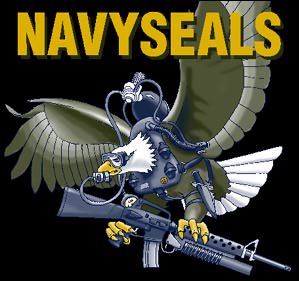 Sometime that afternoon, seemingly out of nowhere,
a 20 foot inflatable raft pops up out of the water and comes planing over toward us.
The raft contains six or eight
Navy SEALS, decked out in full military regalia.
They have the Navy SEAL watches, the Navy SEAL utility belts, filled with various SEAL
survival tools and weapons;
they wear SEAL suits and have SEAL masks, and tanks, and snorkels.
All dressed in black.
They are about 18 years old, about 200 pounds, and clearly not to be messed with.
They have come to shoo us along.
"We're conducting maneuvers here and you'll need to exit this sector, captain."
"Sir, yes sir." we reply in unison, "We'll just maneuver our butts right on out of your sector, a.s.a.p."
On we go.
Sometime that afternoon, seemingly out of nowhere,
a 20 foot inflatable raft pops up out of the water and comes planing over toward us.
The raft contains six or eight
Navy SEALS, decked out in full military regalia.
They have the Navy SEAL watches, the Navy SEAL utility belts, filled with various SEAL
survival tools and weapons;
they wear SEAL suits and have SEAL masks, and tanks, and snorkels.
All dressed in black.
They are about 18 years old, about 200 pounds, and clearly not to be messed with.
They have come to shoo us along.
"We're conducting maneuvers here and you'll need to exit this sector, captain."
"Sir, yes sir." we reply in unison, "We'll just maneuver our butts right on out of your sector, a.s.a.p."
On we go.
 By now we are sailing a glorious broad reach with a full main and an even fuller spinnaker.
It must be around 17:00 and we have decided to sail through the night along the south coast of Puerto Rico.
Tomorrow we will be at Boqueron on the western end of the island and that will give us a half a lay-day--
if we don't get stopped by the authorities!
By now we are sailing a glorious broad reach with a full main and an even fuller spinnaker.
It must be around 17:00 and we have decided to sail through the night along the south coast of Puerto Rico.
Tomorrow we will be at Boqueron on the western end of the island and that will give us a half a lay-day--
if we don't get stopped by the authorities!
 We have seen the Coast Guard
off and on, flying overhead and patrolling the coast in cutters.
About this time, the inevitable seems inevitable.
A cutter motoring about a quarter mile off of our starboard side hails us on the radio.
The tone of inquisition is not encouraging.
"Sailing vessel, sailing vessel.
This is the US Coast Guard cutter yah-de-yah.
Where are you bound for?
Where was your last port of call?
How many people are on board?
Do you have flares?
PFDs?
An EPIRB? ..."
I reply to these questions with the polite indifference that I hope bespeaks confidence.
We have seen the Coast Guard
off and on, flying overhead and patrolling the coast in cutters.
About this time, the inevitable seems inevitable.
A cutter motoring about a quarter mile off of our starboard side hails us on the radio.
The tone of inquisition is not encouraging.
"Sailing vessel, sailing vessel.
This is the US Coast Guard cutter yah-de-yah.
Where are you bound for?
Where was your last port of call?
How many people are on board?
Do you have flares?
PFDs?
An EPIRB? ..."
I reply to these questions with the polite indifference that I hope bespeaks confidence.
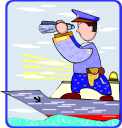 At the end of the interrogation dialog, the very explicitly announce their intentions.
"We are sending over a boarding party to board your vessel.
Stay your course and, when they arrive, do not offer assistance to the boarders.
I repeat, do not offer assistance."
"Roger-dodger," I rely.
At the end of the interrogation dialog, the very explicitly announce their intentions.
"We are sending over a boarding party to board your vessel.
Stay your course and, when they arrive, do not offer assistance to the boarders.
I repeat, do not offer assistance."
"Roger-dodger," I rely.
 We sit, and sail on.
Ten minutes passes.
Twenty minutes passes.
The better part of one hour passes.
I am tempted to get back on the radio and ask if they have forgotten about us,
but clearly the cutter is shadowing us and there is activity on deck.
Patiently, we sail on.
After an hour of waiting, an inflatable dinghy is launched from the cutter and,
with its boarding party of six green cadets dressed in white,
heads over to inspect us for drugs, aliens, and other flagrant and not so flagrant violations of coastal law.
We sit, and sail on.
Ten minutes passes.
Twenty minutes passes.
The better part of one hour passes.
I am tempted to get back on the radio and ask if they have forgotten about us,
but clearly the cutter is shadowing us and there is activity on deck.
Patiently, we sail on.
After an hour of waiting, an inflatable dinghy is launched from the cutter and,
with its boarding party of six green cadets dressed in white,
heads over to inspect us for drugs, aliens, and other flagrant and not so flagrant violations of coastal law.
 Now then,… Max Smith went to my high school and by all reckoning he was
and is one of the dumbest people to have walked the planet since we descended from trees and began walking upright.
(To his credit, last I knew Max had beaten all of the book-maker's odds and was still alive
and doing well as a night watchman in Alabama.)
Max was as strong and as paranoid as he was dumb,
and reasoning with Max was never the way to resolve anything.
One time, when his parents had left him home alone at night,
Max heard a noise in his front yard.
Fearing for the worst,
he leveled a twelve gauge shotgun at his screen door and proceeded to fill his front lawn with buckshot,
right through the screen door,
hoping that whatever or whoever was out there would either die or run off and leave him alone.
After that, no one would drop by Max's house unannounced.
Anyway, before becoming a night watchman, Max was in the Coast Guard.
As the dinghy approaches, I am just a little nervous that it may contain 6 Max-es;
armed, scared, and dumb as algae.
Now then,… Max Smith went to my high school and by all reckoning he was
and is one of the dumbest people to have walked the planet since we descended from trees and began walking upright.
(To his credit, last I knew Max had beaten all of the book-maker's odds and was still alive
and doing well as a night watchman in Alabama.)
Max was as strong and as paranoid as he was dumb,
and reasoning with Max was never the way to resolve anything.
One time, when his parents had left him home alone at night,
Max heard a noise in his front yard.
Fearing for the worst,
he leveled a twelve gauge shotgun at his screen door and proceeded to fill his front lawn with buckshot,
right through the screen door,
hoping that whatever or whoever was out there would either die or run off and leave him alone.
After that, no one would drop by Max's house unannounced.
Anyway, before becoming a night watchman, Max was in the Coast Guard.
As the dinghy approaches, I am just a little nervous that it may contain 6 Max-es;
armed, scared, and dumb as algae.
 Now, a 28 foot sailboat sailing downwind with a spinnaker flying
is roughly as stable and predictable as a drunk on rollerskates.
It rolls from port to starboard, pitches from stem to stern,
and wiggles its aft with a yawing motion to boot.
It is not easy to board a boat behaving this way.
It is especially not easy when the cadet steering the inflatable thinks as slow as Max did.
They come along side, nudge the boat.
The leader of the boarding party gets one leg on board,
with one leg still on the inflatable, and his center of gravity somewhere over the waters south of Puerto Rico.
The boats start to separate and the cadet in between starts to look like a Thanksgiving wishbone.
Sensing his predicament, he starts to holler.
At the last second, he launches himself back into the dinghy,
spewing forth a string of profanities that would have impressed Max.
They try again, and again.
We are watching the Keystone Cops!
Except for the fact that they are armed and can serve us up a raft full of grief, we would be howling with laughter.
Now, a 28 foot sailboat sailing downwind with a spinnaker flying
is roughly as stable and predictable as a drunk on rollerskates.
It rolls from port to starboard, pitches from stem to stern,
and wiggles its aft with a yawing motion to boot.
It is not easy to board a boat behaving this way.
It is especially not easy when the cadet steering the inflatable thinks as slow as Max did.
They come along side, nudge the boat.
The leader of the boarding party gets one leg on board,
with one leg still on the inflatable, and his center of gravity somewhere over the waters south of Puerto Rico.
The boats start to separate and the cadet in between starts to look like a Thanksgiving wishbone.
Sensing his predicament, he starts to holler.
At the last second, he launches himself back into the dinghy,
spewing forth a string of profanities that would have impressed Max.
They try again, and again.
We are watching the Keystone Cops!
Except for the fact that they are armed and can serve us up a raft full of grief, we would be howling with laughter.
 By now, the sun is starting to set and I shout over to these clearly very embarrassed cadets,
"Give me 5 minutes to drop the spinnaker and she'll be much easier to board."
I plan to drop it anyway to sail through the night (so it does not actually count as offering assistance.)
By now, the sun is starting to set and I shout over to these clearly very embarrassed cadets,
"Give me 5 minutes to drop the spinnaker and she'll be much easier to board."
I plan to drop it anyway to sail through the night (so it does not actually count as offering assistance.)
 Once the chute is down, the boarding party comes aboard.
Mind you, it is probably a hour and a half from when they first contacted us and
we probably could have consumed all the drugs onboard and applied for citizenship
for the illegal aliens in the time that has passed, but hey, we were clean anyway.
Three of the six come on board, looking a little sheepish, but still trying to maintain a semblance of authority.
They poke around, count the PFDs, look in the lockers for Haitians, and cite us for two infractions:
three of the flares on board officially expired two months ago and
there is no plaque forbidding the discharge of spent motor oil.
"Oh, thank goodness!
I had no idea the flares were expired and I had no plaque.
Thank you, oh guarders-of-our coast,
for bringing these infractions to my attention before some horrible fate befell my vessel."
Instead, I bite my tongue.
Once the chute is down, the boarding party comes aboard.
Mind you, it is probably a hour and a half from when they first contacted us and
we probably could have consumed all the drugs onboard and applied for citizenship
for the illegal aliens in the time that has passed, but hey, we were clean anyway.
Three of the six come on board, looking a little sheepish, but still trying to maintain a semblance of authority.
They poke around, count the PFDs, look in the lockers for Haitians, and cite us for two infractions:
three of the flares on board officially expired two months ago and
there is no plaque forbidding the discharge of spent motor oil.
"Oh, thank goodness!
I had no idea the flares were expired and I had no plaque.
Thank you, oh guarders-of-our coast,
for bringing these infractions to my attention before some horrible fate befell my vessel."
Instead, I bite my tongue.
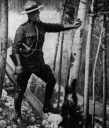 The sun sets and we can only hope that under the cloak of darkness we can remain a little more discrete.
Of course, the only authorities who might still hassle us are the
Canadian Mounties
or the Guardian Angel
subway vigilantes, and neither of these seems likely.
This morning, however, it did not seem likely that the Airforce and Coast Guard would bother us,
and that the Navy would bother us twice!
The sun sets and we can only hope that under the cloak of darkness we can remain a little more discrete.
Of course, the only authorities who might still hassle us are the
Canadian Mounties
or the Guardian Angel
subway vigilantes, and neither of these seems likely.
This morning, however, it did not seem likely that the Airforce and Coast Guard would bother us,
and that the Navy would bother us twice!
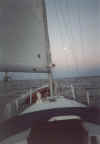 South of Puerto Rico, with a nearly full moon, we have a glorious sail through the night.
The wind is steady, the water is reasonably calm, the stars are spectacular, and the story telling,
and joking, and reminiscing, and camaraderie are the best.
(Almost) entirely in jest, we remind ourselves that whoever is at the helm at the appropriate time
shall be required to leave sufficient water around the morosely named
Isla Caja de Muertos.
We pass the lights of
Playa de Ponce around midnight, and keep on cruising.
Puerto Rico has appreciably more lights than the other islands we have seen thus far,
and some how these lights are reassuring.
South of Puerto Rico, with a nearly full moon, we have a glorious sail through the night.
The wind is steady, the water is reasonably calm, the stars are spectacular, and the story telling,
and joking, and reminiscing, and camaraderie are the best.
(Almost) entirely in jest, we remind ourselves that whoever is at the helm at the appropriate time
shall be required to leave sufficient water around the morosely named
Isla Caja de Muertos.
We pass the lights of
Playa de Ponce around midnight, and keep on cruising.
Puerto Rico has appreciably more lights than the other islands we have seen thus far,
and some how these lights are reassuring.
|
 In the morning, we shove off with the first light.
One or two "type-A's" are jogging laps around the upper decks of the Love Boats,
but otherwise the island is fast asleep.
We head back out of the harbor and steer West; destination Vieques Island and, later, Puerto Rico proper.
There is considerably more boat traffic around the U.S. Virgin Islands than we saw in the BVI,
and infinitely more than we saw on the sail down from Bermuda.
One of these boats--an eighty foot freighter or trawler--comes barreling down on us.
It is crewed and skippered by black island men, one standing, one smoking, one lounging on the top of the cabin,
leg draped over the side. "Hey Mon. Which one is Tortola?", the captain bellows out,
over the din of his diesel engines.
"Huh?" is my first response.
How can you be thirty miles from Tortola with no chart and no local reckoning of where you are going?
He swings around for a second pass.
How can I communicate all of the small islands, passages, reefs, etc. that separate us from Tortola.
In the end, I point Northeast and shout, “Dat-a-way.”
In the morning, we shove off with the first light.
One or two "type-A's" are jogging laps around the upper decks of the Love Boats,
but otherwise the island is fast asleep.
We head back out of the harbor and steer West; destination Vieques Island and, later, Puerto Rico proper.
There is considerably more boat traffic around the U.S. Virgin Islands than we saw in the BVI,
and infinitely more than we saw on the sail down from Bermuda.
One of these boats--an eighty foot freighter or trawler--comes barreling down on us.
It is crewed and skippered by black island men, one standing, one smoking, one lounging on the top of the cabin,
leg draped over the side. "Hey Mon. Which one is Tortola?", the captain bellows out,
over the din of his diesel engines.
"Huh?" is my first response.
How can you be thirty miles from Tortola with no chart and no local reckoning of where you are going?
He swings around for a second pass.
How can I communicate all of the small islands, passages, reefs, etc. that separate us from Tortola.
In the end, I point Northeast and shout, “Dat-a-way.” To the west of St. Thomas lies
To the west of St. Thomas lies 

 Okay.
By my inventory, we had evaded customs in St. Thomas, been bombed by the
Okay.
By my inventory, we had evaded customs in St. Thomas, been bombed by the
 Sometime that afternoon, seemingly out of nowhere,
a 20 foot inflatable raft pops up out of the water and comes planing over toward us.
The raft contains six or eight
Sometime that afternoon, seemingly out of nowhere,
a 20 foot inflatable raft pops up out of the water and comes planing over toward us.
The raft contains six or eight

 At the end of the interrogation dialog, the very explicitly announce their intentions.
"We are sending over a boarding party to board your vessel.
Stay your course and, when they arrive, do not offer assistance to the boarders.
I repeat, do not offer assistance."
"Roger-dodger," I rely.
At the end of the interrogation dialog, the very explicitly announce their intentions.
"We are sending over a boarding party to board your vessel.
Stay your course and, when they arrive, do not offer assistance to the boarders.
I repeat, do not offer assistance."
"Roger-dodger," I rely. We sit, and sail on.
Ten minutes passes.
Twenty minutes passes.
The better part of one hour passes.
I am tempted to get back on the radio and ask if they have forgotten about us,
but clearly the cutter is shadowing us and there is activity on deck.
Patiently, we sail on.
After an hour of waiting, an inflatable dinghy is launched from the cutter and,
with its boarding party of six green cadets dressed in white,
heads over to inspect us for drugs, aliens, and other flagrant and not so flagrant violations of coastal law.
We sit, and sail on.
Ten minutes passes.
Twenty minutes passes.
The better part of one hour passes.
I am tempted to get back on the radio and ask if they have forgotten about us,
but clearly the cutter is shadowing us and there is activity on deck.
Patiently, we sail on.
After an hour of waiting, an inflatable dinghy is launched from the cutter and,
with its boarding party of six green cadets dressed in white,
heads over to inspect us for drugs, aliens, and other flagrant and not so flagrant violations of coastal law. Now then,… Max Smith went to my high school and by all reckoning he was
and is one of the dumbest people to have walked the planet since we descended from trees and began walking upright.
(To his credit, last I knew Max had beaten all of the book-maker's odds and was still alive
and doing well as a night watchman in Alabama.)
Max was as strong and as paranoid as he was dumb,
and reasoning with Max was never the way to resolve anything.
One time, when his parents had left him home alone at night,
Max heard a noise in his front yard.
Fearing for the worst,
he leveled a twelve gauge shotgun at his screen door and proceeded to fill his front lawn with buckshot,
right through the screen door,
hoping that whatever or whoever was out there would either die or run off and leave him alone.
After that, no one would drop by Max's house unannounced.
Anyway, before becoming a night watchman, Max was in the Coast Guard.
As the dinghy approaches, I am just a little nervous that it may contain 6 Max-es;
armed, scared, and dumb as algae.
Now then,… Max Smith went to my high school and by all reckoning he was
and is one of the dumbest people to have walked the planet since we descended from trees and began walking upright.
(To his credit, last I knew Max had beaten all of the book-maker's odds and was still alive
and doing well as a night watchman in Alabama.)
Max was as strong and as paranoid as he was dumb,
and reasoning with Max was never the way to resolve anything.
One time, when his parents had left him home alone at night,
Max heard a noise in his front yard.
Fearing for the worst,
he leveled a twelve gauge shotgun at his screen door and proceeded to fill his front lawn with buckshot,
right through the screen door,
hoping that whatever or whoever was out there would either die or run off and leave him alone.
After that, no one would drop by Max's house unannounced.
Anyway, before becoming a night watchman, Max was in the Coast Guard.
As the dinghy approaches, I am just a little nervous that it may contain 6 Max-es;
armed, scared, and dumb as algae. Now, a 28 foot sailboat sailing downwind with a spinnaker flying
is roughly as stable and predictable as a drunk on rollerskates.
It rolls from port to starboard, pitches from stem to stern,
and wiggles its aft with a yawing motion to boot.
It is not easy to board a boat behaving this way.
It is especially not easy when the cadet steering the inflatable thinks as slow as Max did.
They come along side, nudge the boat.
The leader of the boarding party gets one leg on board,
with one leg still on the inflatable, and his center of gravity somewhere over the waters south of Puerto Rico.
The boats start to separate and the cadet in between starts to look like a Thanksgiving wishbone.
Sensing his predicament, he starts to holler.
At the last second, he launches himself back into the dinghy,
spewing forth a string of profanities that would have impressed Max.
They try again, and again.
We are watching the Keystone Cops!
Except for the fact that they are armed and can serve us up a raft full of grief, we would be howling with laughter.
Now, a 28 foot sailboat sailing downwind with a spinnaker flying
is roughly as stable and predictable as a drunk on rollerskates.
It rolls from port to starboard, pitches from stem to stern,
and wiggles its aft with a yawing motion to boot.
It is not easy to board a boat behaving this way.
It is especially not easy when the cadet steering the inflatable thinks as slow as Max did.
They come along side, nudge the boat.
The leader of the boarding party gets one leg on board,
with one leg still on the inflatable, and his center of gravity somewhere over the waters south of Puerto Rico.
The boats start to separate and the cadet in between starts to look like a Thanksgiving wishbone.
Sensing his predicament, he starts to holler.
At the last second, he launches himself back into the dinghy,
spewing forth a string of profanities that would have impressed Max.
They try again, and again.
We are watching the Keystone Cops!
Except for the fact that they are armed and can serve us up a raft full of grief, we would be howling with laughter. By now, the sun is starting to set and I shout over to these clearly very embarrassed cadets,
"Give me 5 minutes to drop the spinnaker and she'll be much easier to board."
I plan to drop it anyway to sail through the night (so it does not actually count as offering assistance.)
By now, the sun is starting to set and I shout over to these clearly very embarrassed cadets,
"Give me 5 minutes to drop the spinnaker and she'll be much easier to board."
I plan to drop it anyway to sail through the night (so it does not actually count as offering assistance.) Once the chute is down, the boarding party comes aboard.
Mind you, it is probably a hour and a half from when they first contacted us and
we probably could have consumed all the drugs onboard and applied for citizenship
for the illegal aliens in the time that has passed, but hey, we were clean anyway.
Three of the six come on board, looking a little sheepish, but still trying to maintain a semblance of authority.
They poke around, count the PFDs, look in the lockers for Haitians, and cite us for two infractions:
three of the flares on board officially expired two months ago and
there is no plaque forbidding the discharge of spent motor oil.
"Oh, thank goodness!
I had no idea the flares were expired and I had no plaque.
Thank you, oh guarders-of-our coast,
for bringing these infractions to my attention before some horrible fate befell my vessel."
Instead, I bite my tongue.
Once the chute is down, the boarding party comes aboard.
Mind you, it is probably a hour and a half from when they first contacted us and
we probably could have consumed all the drugs onboard and applied for citizenship
for the illegal aliens in the time that has passed, but hey, we were clean anyway.
Three of the six come on board, looking a little sheepish, but still trying to maintain a semblance of authority.
They poke around, count the PFDs, look in the lockers for Haitians, and cite us for two infractions:
three of the flares on board officially expired two months ago and
there is no plaque forbidding the discharge of spent motor oil.
"Oh, thank goodness!
I had no idea the flares were expired and I had no plaque.
Thank you, oh guarders-of-our coast,
for bringing these infractions to my attention before some horrible fate befell my vessel."
Instead, I bite my tongue. The sun sets and we can only hope that under the cloak of darkness we can remain a little more discrete.
Of course, the only authorities who might still hassle us are the
The sun sets and we can only hope that under the cloak of darkness we can remain a little more discrete.
Of course, the only authorities who might still hassle us are the
